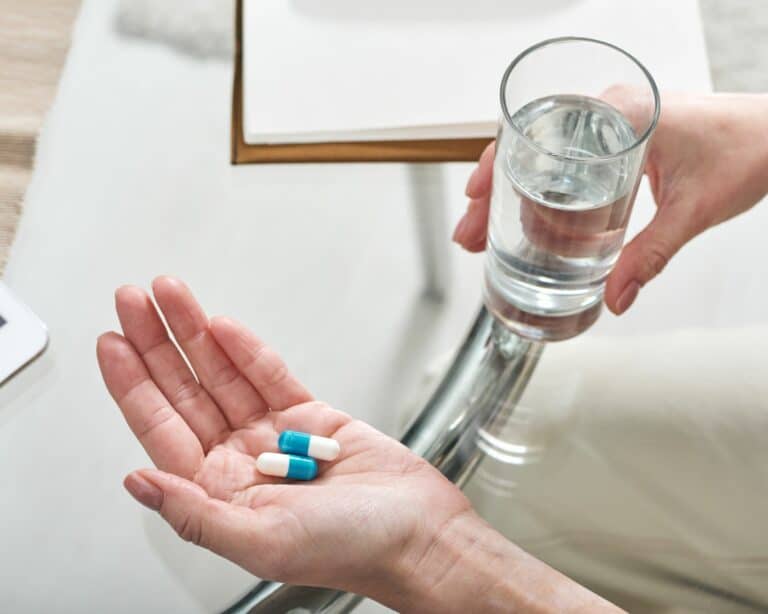Prolonged periods of opioid use or abuse can lead to changes in your body and brain. Over time, your body can adapt to the presence of opioids and come to depend on them to function. When people who have been using opioids regularly stop using them are likely to experience uncomfortable withdrawal symptoms.
Withdrawal from opioids can be physically and emotionally challenging. Flu-like body aches, insomnia, nausea, and other symptoms can make people miserable and lead to relapse. Intense cravings common with opioid withdrawal can also lead to relapse before people get the chance to detox completely.
Some medications traditionally used under medical supervision to relieve opioid withdrawal symptoms can lead to dependency and withdrawal. But a new drug called Lucemyra (lofexidine) offers relief to people in opioid withdrawal without the risk of potential complications that other opioid treatment medications carry.
Learn more about using Lucemyra during opioid withdrawal so that you can make the best choices about your treatment. For more information about starting treatment or to learn about our other supportive programs, reach out to the Woburn Addiction Treatment staff today.
What is Lucemyra?
Lucemyra is the brand name of a medication called lofexidine. The FDA approved Lucemyra for use in addiction treatment to treat opioid withdrawal symptoms in 2018.
According to the manufacturer, Lucemyra can be used to partially alleviate symptoms caused by opioid withdrawal. It is not a treatment for opioid use disorder and cannot completely relieve withdrawal symptoms.
Lucemyra works by blocking the release of a neurotransmitter called norepinephrine. Norepinephrine works in the body to stimulate the central nervous system (CNS) and is believed to contribute to people’s opioid withdrawal symptoms.
During opioid withdrawal, people’s norepinephrine levels may be elevated, leading to increased CNS activity. By blocking the release of norepinephrine, Lucemyra can limit the overactivity of the CNS that causes some of the most uncomfortable and disruptive symptoms of withdrawal.
How Can Lucemyra Treat the Opioid Withdrawal Symptoms?
Opioid withdrawal can be very challenging. The symptoms of opioid withdrawal often begin soon after a person’s last dose of opioid drugs and can last for days or weeks–and sometimes longer.
Common symptoms of opioid withdrawal include:
- Stomach cramps
- Diarrhea
- Nausea and vomiting
- Body aches
- Chills
- Watery eyes
- Increased heart rate
- Yawning
- Insomnia
The symptoms of withdrawal can interfere with a person’s life and make them feel physically and emotionally awful. In many cases, the severity of a person’s symptoms may lead them to relapse to get relief from their discomfort.
Lucemyra offers hope and comfort to people with opioid withdrawal. Some medical providers use Lucemyra during opioid detox to help alleviate people’s withdrawal symptoms and keep them more comfortable during the process.
Lucemyra should not be used as an alternative to opioid addiction treatment. Instead, it can be a valuable tool to complement a comprehensive treatment program that addresses addiction’s physical, emotional, and behavioral aspects. Addiction treatment programs often use a combination of evidence-based and holistic treatments to support whole-person recovery, including:
- Individual counseling
- Group therapy
- Education
- Medications
- Medical and mental health treatment
- Family therapy
- Holistic therapies like nutrition counseling, exercise, art therapy, and mindfulness
Using Lucemyra during opioid detox can help people achieve a safe, complete detox so that they can be successful in a comprehensive treatment program.
How is Lucemyra Used to Treat Addiction Recovery?
You should only take Lucemyra under the guidance and supervision of your doctor or another medical provider. Read all the information that comes with the medication and take it exactly as prescribed.
Generally, Lucemyra is safe to take for up to two weeks. Your doctor may adjust the dose you take at different times of the detox process to manage your changing withdrawal symptoms. During the peak of withdrawal, people may take 0.54mg of Lucemyra every 5 to 6 hours. Lofexidine can be taken with food or on an empty stomach. In clinical trials, Lucemyra worked best during days two and three, when symptoms are often the most severe.
You should not suddenly stop taking Lucemyra. If you do, you may experience intense opioid withdrawal symptoms or experience a quick increase in blood pressure. Your doctor will help you taper off Lofexidine when the time is right.

Get The Care You Need and Deserve
Woburn Addiction Treatment is a leader in the addiction treatment field, with proven success in facilitating long-term recovery. Our team of top clinical & medical experts specializes in treating addiction coupled with mental illness, ensuring that each person receives individualized care. Call us – we’re available 24/day, 7 days/week.
The Side Effects of Lucemyra (lofexidine)
Some medications commonly used to treat withdrawal symptoms during opioid detox, including methadone and Suboxone, can cause unpleasant side effects. While Lucemyra does cause some side effects, they are often less significant than those from other medications.
Commonly-reported side effects of lofexidine include:
- Low blood pressure
- Fainting
- Dizziness
- Dry mouth
- Slowed heart rate
- Drowsiness
People taking Lucemyra should not drink alcohol or take other sedative medications, including barbiturates and benzodiazepines. Combining sedative substances and lofexidine can lead to dangerous respiratory depression. Some people may experience dehydration while taking Lucemyra, so it’s essential to drink water and other non-caffeinated beverages to avoid this.
Get Help Now
If you want to learn more about using Lucemyra (lofexidine) during opioid detox or any of our supportive opioid treatment programs, reach out to the Woburn Addiction Treatment specialists today.


